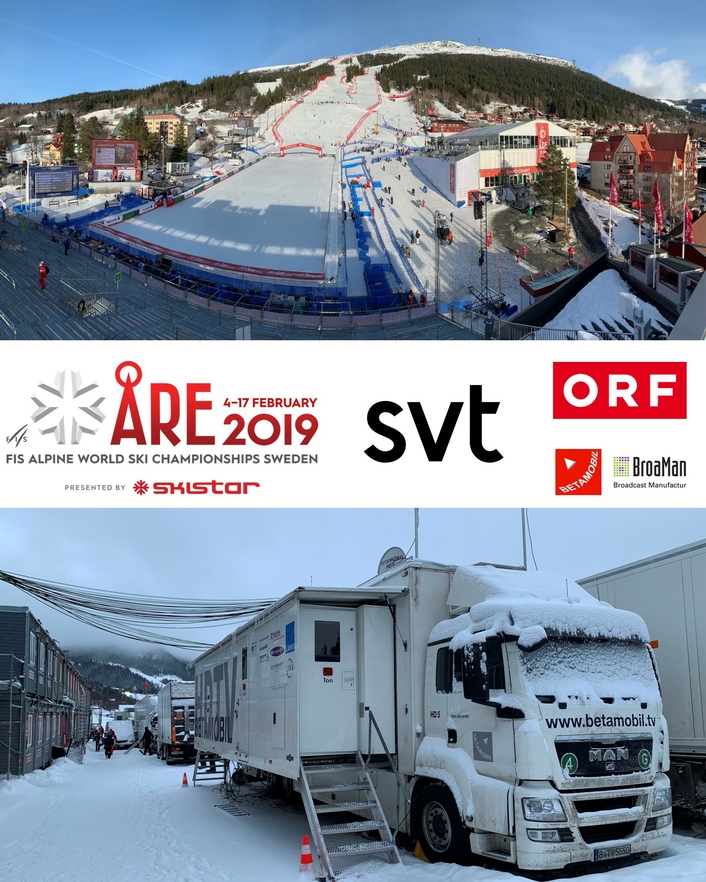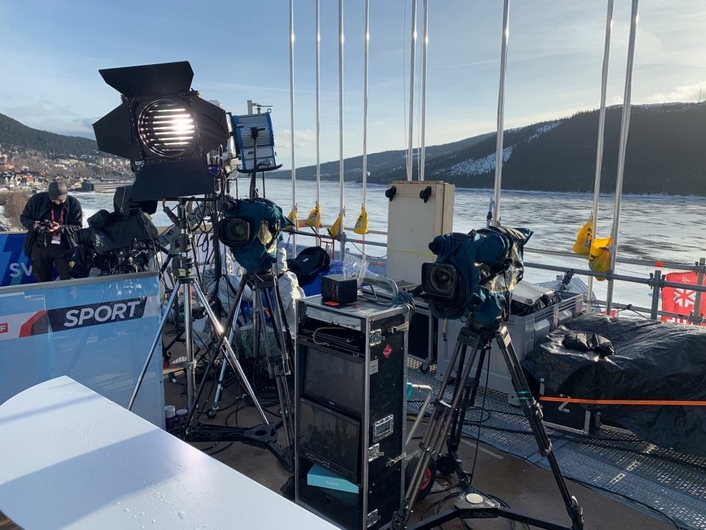The Production of the Alpine Ski World Championships in Åre for ORF
posted:
Facts & Figures Åre 2019
- 11 medal events
- 2 qualification races
- 75 nations (a new record!)
- 471 athletes: 177 ladies, 294 men
- 1’320’000 Swiss francs in prize money
- 915 officials
- 1439 volunteers from 38 countries
- 7116 accredited people
- 3546 rooms with 4854 beds
- 4000 liters of blue food color paint
advertisment
SVT’s production concept set a new standard in the broadcasting of major sports events. Instead of the traditional methods, SVT decided to execute Åre 2019 as remote production. This meant that the 2019 Championships had the most environmentally friendly TV production in history.
Remote production offers various benefits. Instead of the traditional solution of two or more semi-trailers running on diesel fuel and providing power for on-site production in Åre, most production is done in SVT’s offices in Stockholm powered by renewable energy, with diesel generators only as a back-up in the (unlikely) event of a power failure.
advertisment
Around 75 uncompressed HD camera signals were transported in IP via two 100 Gbps Telia fiber circuits from the events in central Sweden to SVT’s three control rooms back in Stockholm. The main director and vision mixer operator for both events were directing from galleries in Åre and Östersund that were connected to SVT’s central control rooms.
advertisment
Due to the important role alpine skiing plays for Austria, ORF had decided to take the international signal produced by SVT and to enhance it with 10 additional cameras for the production of the unilateral signal for their Austrian fans. For this purpose ORF had hired the German production company Betamobil from Berlin and Betamobile has send his OB Van Ü5 to Sweden together with a dedicated team of technicians to handle this for the ORF producers and moderators.
advertisment
The main tasks for Betamobil were the integration of the additional camera signals from
- a dedicated studio position in the finish area
- various announce positions
- a commentator position
- various interview positions in the mixed zone
- a second studio at Medal Plaza where ORF could realise complete reviws for their evening program
- Integration of the signals from 2x LiveU units
advertisment
To simplify the technical infrastructure, 4 pairs of BroaMan MUX22 systems, each with Optocore X6R-TP, were used. This allowed the set up of extremely flexible stage box systems for the transport of all the required signals (audio/video/data) to the presenter / interview positions as well as to the commentator position and the studio. Each stagebox only needed the connection with two singelemode fiber cables to connect and to distribute all the required signals.
advertisment
The BroaMan stagebox at Medal Plaza was connected via 3km dark fiber cable with the OB Van and also here the signals were transferred without any problems even if various different interfaced were used.
advertisment
The flexibility of the BroaMan / Optocore Stagebox system developed by Betamobil simplifies the wiring efforts considerably. With the Betamobil BroaMan / Optocore Stagebox systems, 4 HD-SDI 1080p50 video signals, 8 analogue audio signals, 2 IP network signals and the signals to 4 Riedel intercom panels (via AES paths) can be transmitted in each direction inexpensively.
advertisment
Two weeks of FIS Alpine World Ski Championships 2019 held at the National Arena in Åre, Sweden, finished on Sunday, 17 February, with the final slalom contest and the Closing Ceremony. The event saw new world champions crowned in downhill, super-G, giant slalom, slalom, alpine combined and the alpine team event, and broke new ground in remote production.
The final day offered Austria's spoiled team the last chance, to still get a gold medal and prevent the first "goldless" World Championships for 32 years. TheAustrian slalom men did it with a bang: with his seventh gold medal Marcel Hirscher became the most successful Alpine athlete at the World Championships. Michael Matt and Marco Schwarz provided a sensational Austrian triple with silver and bronze.
For two weeks, alpine skiers fought in Aare, Sweden, for the title of world champion. The farewells of Lindsey Vonn and Aksel Lund Svindal, who competed in their last races at the World Cup, were as much a focus as superstars Mikaela Shiffrin and Marcel Hirscher.
In addition to delivering a first class Alpine World Championship, Åre 2019 had focused on delivering positive legacies and making sustainable choices in all their planning and preparations. The vision to inspire the world to Ski has been the driving force behind the main investment decisions. The new Arena House and the slopes both in the Swedish Alpine National Arena and in Duved are examples of a work towards achieving that vision.












